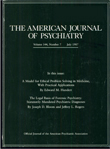Olfactory Function in Monozygotic Twins Discordant for Schizophrenia
Abstract
OBJECTIVE: Abnormalities of olfactory identification ability have been proposed as a marker of cerebral dysfunction in schizophrenia. The authors studied the potential role of genetic factors in olfactory dysfunction by assessing monozygotic twins discordant for schizophrenia and matched comparison subjects. METHOD: The subjects were 12 pairs of monozygotic twins discordant for schizophrenia and 12 healthy subjects matched for sex and age. Each subject completed the University of Pennsylvania Smell Identification Test. RESULTS: The combined twin group scored significantly lower on smell identification than did the comparison group. The affected and unaffected twin groups did not differ from each other. CONCLUSIONS: Genetic factors may contribute to cerebral dysfunction as assessed by olfactory identification ability. (Am J Psychiatry 1998; 155:134–136)



